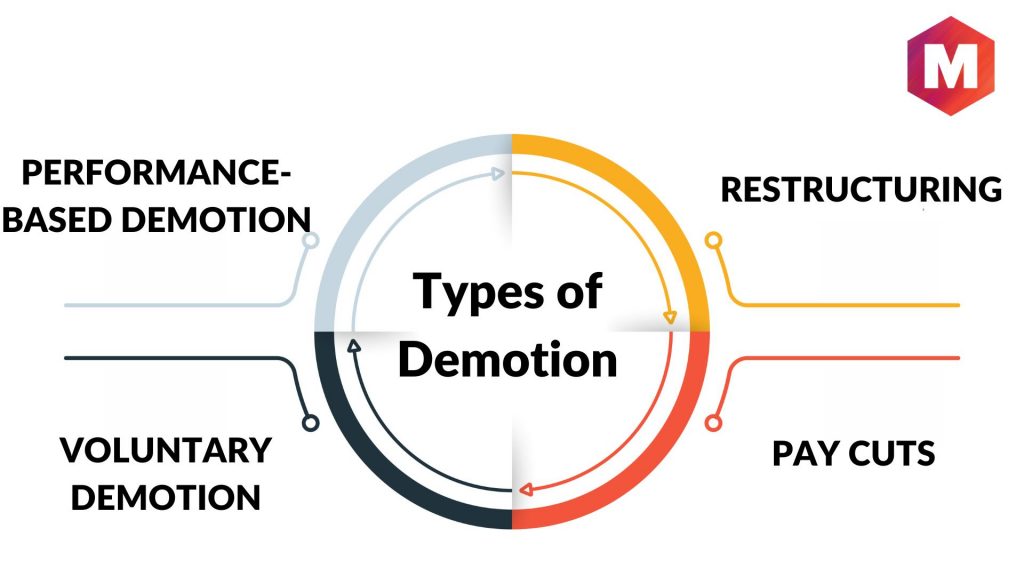Table of Contents
What Is a Demotion?
Definition: A demotion is a company’s (or sometimes an employee’s) decision to lower an employee’s status, title, and (often) salary or payment. Demotions are generally seen as negative events, often because they involve a step back in an employee’s career path. Demotions may also be accompanied by a pay cut.
Most demotions are involuntary, meaning that the employer makes the decision to demote an employee without the employee’s consent. In some cases, however, an employee may agree to a demotion in order to avoid being fired. Demotions can also be voluntary in specific situations when an employee desires this for some personal reason.
Demotions can be voluntary or involuntary and may come with a pay cut. There are a few different reasons why an employee may be demoted.
The most common reason is poor employee performance, which can be due to a variety of factors such as not meeting deadlines, not following instructions, or not producing quality work. Demotions can also be the result of misconduct, such as harassment, theft, or violence. In some cases, an employee may be demoted due to a company reorganization or because they no longer have the necessary skills for their current position.
When an employee is demoted, they might face permanent reassignment to a lower-paying job. This can happen for a variety of reasons, including position elimination or required skill changes. Position elimination is also often called demotion. It is the process of removing an employee from their current position, either permanently or temporarily, and placing them in a lower-paying position. This can be done for a variety of reasons, such as downsizing, performance issues, or a change in the company’s needs.
Types of Demotion
1. Performance-based demotion
A performance-based demotion is when an employee is demoted due to poor job performance. This type of demotion is usually the result of the employee not meeting the expectations of their position, such as not meeting deadlines, not following instructions, or producing poor quality work.
2. Restructuring
A company may go through a restructuring process in which the company’s structure or operations are changed. This can often lead to employees being demoted to lower positions within the company.
3. Pay cuts
In some cases, an employee may be demoted and have their pay cut as well. This usually happens when an employee is demoted to a lower position within the company or if their workload is reduced.
4. Voluntary demotion
Demotions can also be voluntary, which typically happens when an employee requests a lower position within the company in order to take on different responsibilities or for personal reasons.
Reasons for Demotions
There are a few different reasons why an employee may be demoted such as-
1. Poor Performance
One of the most common reasons for a demotion is the poor performance at work. This can be due to a variety of factors such as not meeting deadlines, not following instructions, or not producing quality work.
2. Misconduct
Demotions can also be the result of misconduct, such as harassment, theft, or violence.
3. No Longer Needed Skills
In some cases, an employee may be demoted due to a company reorganization or because they no longer have the necessary skills for their current position.
4. Requested by Employee
It is a type of voluntary demotion in which an employee demands to get demoted due to some specific reasons.
5. To Avoid Being Fired
In some cases, an employee may agree to a demotion in order to avoid being fired.
The Demotion Process – Four steps of demoting an Employee
If an employer decides to demote an employee, there are a few steps they should take in order to ensure the process is fair and legal.
1. Communicate with the employee
The first step in the demotion process is to communicate with the employee about the decision. It is important to be clear about the reasons for the demotion and what the new position will entail. The employee should also be given a chance to ask questions and voice any concerns.
2. Describe the new position
The next step is to provide the employee with a detailed description of the new position, including any changes in pay, benefits, or responsibilities. It is important to be clear about what is expected from the employee in their new role.
3. Create a transition strategy
Demotions can be disruptive to an employee’s career and personal life, so it is important to create a transition strategy that will help them adjust to the changes. This may include providing additional training or support, offering flexible work arrangements, or easing into the new role over time.
4. Inform the appropriate individuals
Once the decision to demote an employee has been made, it is important to inform the appropriate individuals, such as the employee’s manager, human resources, and other staff members. This will help ensure that everyone is on the same page and that the transition goes smoothly.
The Impact of Demotions
While demotions are generally seen as negative events, they can sometimes have a positive impact on an employee’s career. Demotions can offer employees the chance to start fresh in a new position, learn new skills, or take on different responsibilities. In some cases, demotions can also be motivating factors that help employees improve their performance and avoid future problems.
However, demotions can also have a negative impact on an employee’s morale and motivation. Demotions can be humiliating and cause feelings of inadequacy or insecurity. They can also lead to resentment and conflict within the workplace. For these reasons, it is important to handle demotions carefully and thoughtfully in order to minimize the negative impact on the employee and the company.
How to Respond to a Demotion
1. Asking for additional details or feedback
If you have been demoted, it is important to ask for additional details or feedback from your employer. This will help you understand the reasons for the demotion and what is expected of you in your new role. It can also be helpful to ask for advice on how to succeed in your new position.
2. Updating your resume
Demotions can disrupt your career, so updating your resume as soon as possible is important. This will help you keep track of your accomplishments and skills, and it will make it easier to apply for new jobs in the future.
3. Being aware that you’re still competent and qualified
Demotions can be discouraging, but it is important to remember that you are still competent and qualified. Demotions do not always reflect on an employee’s ability or worth. Instead, they may be due to factors such as company restructures or changes in management.
4. Consider Whether You Want to Try to Climb Back Up
Demotions can be difficult to deal with, but it is important to consider whether you want to try to climb back up the corporate ladder. In some cases, employees who have been demoted use the experience as motivation to work hard and prove themselves in their new role. Others decide that the best course of action is to look for a new job outside of the company. Either way, it is important to weigh your options and make the decision that is best for you.
How To Handle A Demotion
1. Understand the reasons for the demotion
Demotions can be given for a variety of reasons, so it is important to understand the reasons behind your demotion. This will help you determine whether the demotion was warranted and how to avoid similar problems in the future.
2. Talk to your manager
Demotions can be difficult to deal with, so it is important to talk to your manager about the situation. This will help you understand the reasons for the demotion and what is expected of you in your new role.
3. Getting support
Demotions are tough to handle, so it is important to get support from family and friends. They can offer encouragement and help you through this tough time.
4. Reflecting on what happened
Demotions can be a shock, but it is important to take some time to reflect on what happened. This will help you understand the reasons for the demotion and how to avoid similar problems in the future.
5. Creating a plan
Demotions can be disruptive to your career, so it is important to create a plan for how you will move forward. This may include updating your resume, applying for new jobs, or taking on additional responsibilities at your current job.
6. Strategizing for your future
Demotions can be difficult to deal with, but it is important to remember that they do not have to define your future. Demotions can be used as a learning experience to help you strategize for your future career. Use this experience to create a plan and set goals for yourself so that you can move forward in your career.
7. Talk to a professional
Demotions can be highly demotivating, so it is important to talk to a professional if you are having trouble dealing with the situation. A therapist or counselor can help you understand the reasons for the demotion and how to deal with the situation. Demotions do not have to be permanent, so talking to a professional can help you create a plan to get back on track in your career.
Demotion can destructively affect an employee’s morale and motivation. Demotions can also lead to resentment and conflict within the workplace. For these reasons, it is important to handle demotions carefully and thoughtfully in order to minimize the negative impact on the employee and the company.
Difference between demotion and termination?
Demotions involve a change in job title or responsibilities, while terminations involve the end of employment. Demotions can be voluntary or involuntary, while terminations are always involuntary. Demotions can be temporary or permanent, while terminations are always permanent. Demotions may or may not involve a reduction in pay, while terminations always involve a loss of pay. Demotions can be given for reasons such as job performance or company restructures, while terminations are usually given for reasons such as misconduct or poor job performance.
After a Demotion: Should You Stay or Move On?
Whether to stay or move on after a demotion depends on many factors. Some things to consider when making the decision of whether to stay or move on after a demotion include
- The reasons for the demotion
- Whether the demotion is temporary or permanent
- The impact of the demotion on your salary and benefits
- The impact of the demotion on your career
- The company culture and support system
- Your personal goals and plans
How To Explain a Demotion In a Job Interview
If you are asked about a demotion in a job interview, it is important, to be honest, and candid. Demotions can happen for many reasons, so it is important to explain the reasons for your demotion in a positive light. For example, you might say that you were demoted because you took on too much responsibility at your previous job or because of company restructuring. It is also important to emphasize what you learned from the experience and how it has made you a better employee.
Conclusion!
If you’re facing demotion at work, it can be a difficult and confusing time. You may be wondering what led to this decision, and what it means for your future at the company. One of the most common reasons for demotion is poor employee performance. If you’ve been struggling to meet your job responsibilities, it’s likely that your manager has been keeping an eye on your progress. In some cases, a demotion may be the first step before being let go from the company.
Another reason for demotion can be organizational restructuring. If your company is going through changes, they may need to reassign employees to different positions. This can often mean a lower pay grade or fewer responsibilities. If you’re demoted, you may also have to job search for a new position within the company. This can be especially challenging if you’re not familiar with the hiring process or don’t have the required skills for the role.
Fortunately, there are a few things you can do to make the transition easier. First, take some time to understand why you were demoted. This will help you determine what kind of position you should be looking for. Next, brush up on your job search skills by taking some online courses or reading articles on the subject. Finally, be prepared to answer interview questions about your previous position and why you’re interested in the new role.
With some planning and preparation during job searching and incorporating the required skill, you can successfully find a new position that’s a better fit for your skills.
Liked this post? Check out the complete series on Human resources


